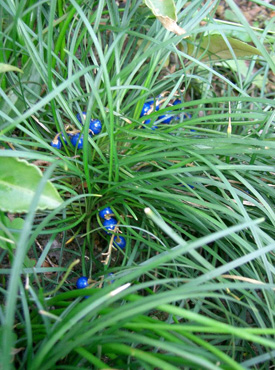| Ophiopogon is a true blessing to those with Yin deficiency.
Sweet, cooling and moistening, it nourishes Yin and clears deficient heat while at the same time expectorating phlegm for the lungs. Those who have ever experienced Yin deficient heat (a dry condition) concurrent with phlegm (a wet condition) know how tricky treatment of this combined pattern can be. To have an herb that clears phlegm while moistening Yin is a gift indeed. I first learned of the powers of ophiopogon years ago when I had a patient with a dry, non-productive cough (before I knew of Li Fei, which I wrote about in my last blog entry). |
|
She had heat in the Lungs but dryness, too, along with low energy and spirits. I gave her Ophiopogon Combination (Mai Men Dong Tang) and within a day, her cough had become productive. Several days later, her phlegm cleared, energy returned and spirits rose. The woman’s cough had lingered about three weeks past the acute stage and she was back to work but she didn’t fully feel normal. Many times this stage indicates the use of Minor Bupleurum Combination (Xiao Chai Hu Tang) but in her case, the cough was dry and non-productive with no coating on her tongue. If I had given her Minor Bupleurum Combination, she might have gotten worse from the cool, dry and bitter Bupleurum. I recognized the Yin deficient signs, however — the key one being the dry, non-productive cough — and so Ophiopogon Combination did the trick. I also use ophiopogon as a simple, giving the single herb to nourish Stomach, Lung and Heart Yin, to clear symptoms of dry, burning eyes, dry tongue, mouth and lips, burning in the five spaces (chest, palms and soles), weak lungs, chronic dry cough and thirsting and wasting disorders (pre-diabetic and TB-type conditions). As well, it is a major herb in the Liver/Kidney Yin tonifying formula, Yi Guan Jian, another favorite of mine. When Yin is deficient, not only do deficient heat symptoms arise, but also the body’s energy considerably weakens. While most people associate Qi with energy, energy can also be low due to deficient Blood, Yin and/or Yang. Ophiopogon is not only great for this, but in general for the aftermath of fevers or febrile disease with Yin deficiency. As well, it moistens the intestines for dry constipation, and moistens dry mouth, throat, lips and eyes. What exactly does Yin deficiency look like in a patient? Deficient Yinis a lack of cooling, moistening Fluids with resulting depletion (fatigue, exhaustion, emaciation or thinness) along with specific types of Heat and Dryness signs, including: night sweats, malar flush (redness and burning heat along the cheeks and nose), burning sensation in the palms of the hands, soles of the feet and in the chest (also known as ‘five-palm heat’), afternoon fever or feelings of heat, restless sleep, dry throat or thirst at night, agitation, mental restlessness, dry cough, dry stools, and scanty dark urine. I recently treated another patient with chronic Lung Yin deficiency, but she had also just taken coptis (like goldenseal) for several days to treat what she thought was an intestinal bacterial infection from food poisoning. When I saw her, the middle and lower parts of her tongue had a black coat. In TCM this means either extreme heat or extreme cold (In this case, extreme heat). She also had tremendously low energy. I gave her ophiopogon as a single herb; within a week, the black coat was gone and her energy had returned. Ophiopogon can be purchased as an ornamental grass from nurseries, called “mondo grass” or “Japanese turf lily.” We grow it on our land and one day Michael dug up some of the tubers to eat. They looked like small, white bubbles, and they tasted juicy and sweet — wonderful! |
Ophiopogon Mai Men Dong Sweet, slightly bitter, slightly cold Enters heart, lung and stomach meridians Dosage: 6 – 15 gm; frying in wine reduces its cold properties, which is used in tonifying formulas Contraindications: Of course too much ophiopogon can actually cause coldness and dampness. As well, avoid if there’s diarrhea due to cold from deficiency and congested fluids. Some traditional sources say not to take ophiopogon with Flos tussilago farfara (coltsfoot) and that it counteracts Radix Sophorae flavescentis (ku shen) and Fructificatio Tremellae fuciformis (bai mu er).
Ophiopogon Combination Ophiopogon (mai men dong) Pinellia (ban xia) Ginseng (ren shen) Rice (jing mi) Licorice (gan cao) Jujube dates (da zao) Treats: nausea, vomiting, thirst, dry throat, mouth and skin, dry, non-productive cough, spitting of saliva, dry mouth and throat, hiccups, five palm heat, red tongue with no coat and a weak and rapid pulse. |

